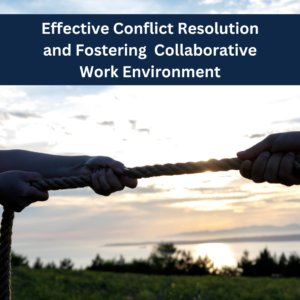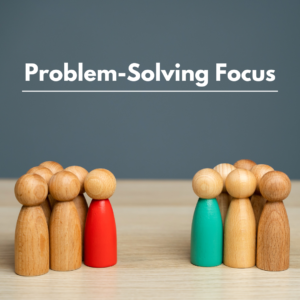Do you know that every unaddressed conflict can waste about eight hours of company time per week in gossip and other unproductive activities, putting a drain on resources and morale as per Research.
When we work with teams, we ask the members if they encounter conflict in their work. They almost always say yes and readily agree that they will face it again in the future. When we probe further to see if they have developed processes for handling conflicts when they emerge, they almost always say no. This is why we believe teams have such a difficult time dealing with conflict.
Team conflict is both natural as well as inevitable. It emerges from many types of differences that the members bring to a team such as education, experience, values, culture, personality, and interests. These differences can sometimes lead to people feeling threatened. They can also create expectations about how others should respond. This, in turn, leads to conflicts when people do not respond in the desired manner, but they don’t have to be detrimental to productivity and morale.
• This article explores the different types of workplace conflicts, their causes, the impact of unresolved conflicts, and provides practical strategies for effective conflict resolution and fostering a collaborative work environment.
Types of Workplace Conflicts
Task-based Conflicts
Disagreements over work responsibilities, deadlines, or the best way to approach a project.
Personality Clashes
Conflicts stemming from differences in communication styles, values, or working preferences.
Leadership Disputes
Disagreements over decision-making, authority, or the direction of the organization.
Generational Gaps
Conflicts arising from differing expectations, work ethics, or technological familiarity between younger and older employees.
Causes of Workplace Conflicts
Communication Breakdowns
Poor communication, misunderstandings, and lack of transparency can lead to conflicts. Employees may have difficulty expressing their concerns or listening to others’ perspectives.
Scarce Resources
Conflicts can arise when employees compete for limited resources, such as budget, equipment, or office space. Unequal distribution of resources can breed resentment and tension.
Personality Differences
Conflicts can stem from differences in work styles, values, and personal preferences. Employees with clashing personalities may find it challenging to collaborate effectively.
Impact of Unresolved Conflicts
Decreased Productivity
Unresolved conflicts can distract employees, disrupt workflow, and lead to a decline in overall productivity. Team members may become disengaged and less focused on their work.
Damaged Morale
Ongoing conflicts can create a negative work environment, leading to increased stress, frustration, and decreased job satisfaction among employees. This can impact employee retention and overall morale.
Reduced Collaboration
Unresolved conflicts can erode trust and cooperation between colleagues, making it difficult to work together effectively. This can hinder the organization’s ability to achieve its goals.
Effective Communication Strategies
Active Listening
Actively listening to understand the other person’s perspective, rather than just waiting for your turn to speak, is crucial for effective
conflict resolution.
Empathy
Putting yourself in the other person’s shoes and trying to understand their feelings and motivations can help diffuse tensions and find common ground.
Constructive Feedback
Providing specific, objective feedback in a calm and respectful manner can help address the issue without escalating the conflict.
Collaborative Problem-Solving
Working together to identify the root cause of the conflict and brainstorming mutually beneficial solutions can help reach a
resolution.
Negotiation Techniques:
Identify Interests
Understand the underlying needs and concerns of all parties involved, rather than focusing solely on their positions.
Explore Options
Brainstorm multiple possible solutions that could meet the needs of everyone involved, rather than just compromising.
Find Common Ground
Identify shared goals and areas of agreement to build a foundation for a mutually beneficial resolution.
Collaborative Approach
Mediation and facilitation focus on finding mutually acceptable solutions, rather than imposing a solution or taking sides.
Problem-Solving Focus
The goal is to address the underlying issues and find a resolution that meets the needs of all parties involved.
Fostering a Collaborative Work Environment
Effective conflict management is essential for maintaining a positive and productive work environment. By addressing conflicts proactively, encouraging open communication, and promoting collaborative problem-solving, organizations can build a culture of mutual respect, trust, and cooperation. This not only improves employee well-being and morale but also enhances the organization’s overall performance and competitiveness.





Well written , onecshould not have any problem in understanding conflict management after reading your article . Ine needs to read it at least two times to clear any doubt or confusing if there have in they mind. One should try to inculcate and incorporate it in they personal life too for a better understanding
Thank you Mr.Arman 🙏